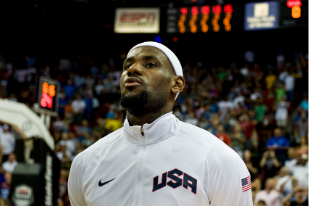This post is part of our Monthly-ish Tips series.
 Those who know me know I readily admit to being grossly (and unapologetically) ignorant when it comes to just about anything sports related. Only every once-in-a-while a news story will catch my eye, as was the case the other day with American basketball superstar LeBron James. LeBron had an important message for his critics, and it’s one we can all learn from.
Those who know me know I readily admit to being grossly (and unapologetically) ignorant when it comes to just about anything sports related. Only every once-in-a-while a news story will catch my eye, as was the case the other day with American basketball superstar LeBron James. LeBron had an important message for his critics, and it’s one we can all learn from.
The catalyst was LeBron catching flak after the Lakers-Pelicans game for hugging a rookie player on the opposing team. In a post-game interview, he was asked about the sentiment behind the “moment” that they shared. In his straightforward reply, he talked about what he sees as his obligation to mentor younger players no matter the team:
Near the end of his response, LeBron addressed any critics who might say it’s a sign of weakness to be buddy-buddy with guys he’s going against. He simply said, “Tell them to kiss my a**. Then added, smiling, “With a smile, too.”
It strikes me squarely between the eyes that LeBron’s mindset, translated into a business context, links directly to what co-author Charlie Green once whimsically called “Buddhist Capitalism,” where trust and collaboration prevail and zero-sum games (I guess both the literal and figurative kind) shift to 1 + 1 = 3 games.
Charlie offers this for his own critics:
For those out there committed to playing the long-term game in business, hear my plea: The next time you’re focused on doing the next right thing and someone says you shouldn’t mentor young people from other firms, or tells you you’re crazy for doing things like having candid conversations with your clients about your competitors’ strengths (not just your own), now you know the inspired response.
Our own professional variations of “Kiss my a**” are the most trustworthy replies because in trust-based business, it’s our responsibility to raise the level of the game for everyone, and always for the ultimate benefit of clients.
At least that’s what I say corporate athleticism looks and sounds like in a Buddhist Capitalist world.
Make It Real
This week, examine what triggers you to focus on “winning” in the short-term rather than playing a more rewarding and lucrative long-term game. What do you discover?
Learn More

Refresh on the four trust principles by watching Charlie Green’s webinar on three anchors for bolstering your business, or brush up on the essential mindsets of trust in Chapter 1 of The Trusted Advisor Fieldbook.
Andrea Howe
Latest posts by Andrea Howe (see all)
- A lesson from my own trust “fail” in my first-ever client meeting - April 15, 2024
- Why choosing silence in the face of awkwardness can be a trust tragedy - March 21, 2024
- What NOT to do when you think you’re being ghosted - February 21, 2024
